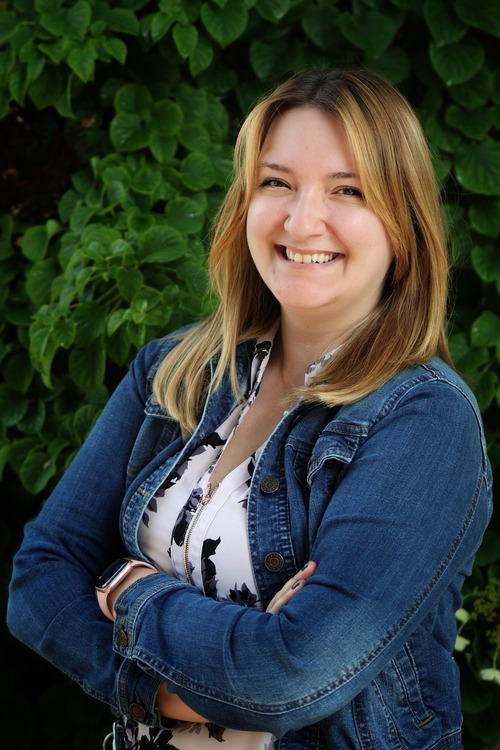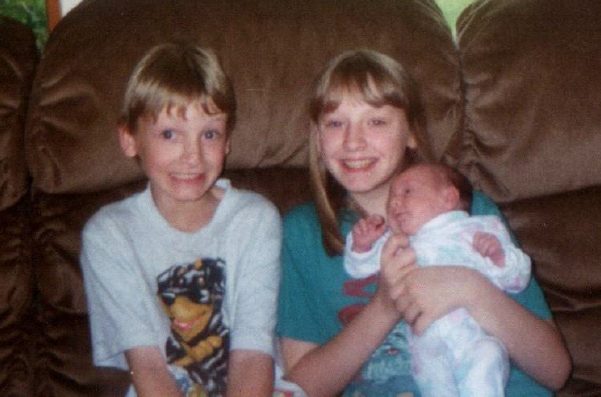Amber Bedore
Amber Bedore is MGI's Academic Program Coordinator. She is an alumna of the department
and was a member of Dr. Chris Waters' lab. Here are her answers to the Micro Biography
questions:

How and when did you become interested in the field(s) of microbiology, genetics,
and/or immunology?
I’ve been interested in science ever since I can remember, especially genetics. I
grew up with two siblings who both had blonde hair and blue eyes. I was the only one
of us that had brown hair and brown eyes. My mom had explained to me that I had gotten
those traits from her, but how and why I inherited those traits when my siblings had gotten different traits had really
intrigued me. I started thinking about family trees and how traits were passed down
from generation to generation. My parents kept lots of old photos of our family members
and I remember studying them over and over trying to find features that matched mine.

When I started school, I absolutely hated it. I was never interested in sitting still
for an entire day while a teacher talked at you and occasionally asked questions with
answers that were very factual and gave no room for discussion. I was much more interested
in doing things and having my own conversations. That all started to change when I got to
high school. I had my first ever biology class and we were taught about things like
mitosis and meiosis, bacterial infections, and human evolution. I no longer felt like
I was just sitting and listening, I felt like I was actually learning things that
felt important to me. Then, I started taking chemistry and anatomy and every other
science class my school had to offer -- which wasn’t many, so in my senior year, my
school paid for me to dual enroll in science courses at a community college twice
a week. I knew at that point that I wanted to apply for a four-year degree at a university
where I could engage more in that sort of material.
I came to MSU in Fall 2014 and I took several genetics courses, both human and microbial,
and loved the idea of looking at the genetic blueprint of complex systems to see how
they operated and why that was important. It was also fun to think about how we could
alter the blueprint to change the system – what happens when we delete this gene?
Or when we overexpress that one? What about sets of genes that work together? I got
to really explore these sorts of questions when I started doing research for my master’s
degree.
Were there any particular people or events who were influential in your journey?
I took Scott Mulrooney’s Introduction to Microbiology course in my junior year of
undergrad and learned all sorts of cool things about bacteria; the history of how
we identified and tried to understand them, their structure and function, how they
sense and respond to their environment, etc. All of this really fascinated and inspired
me to think deeper about microbiology.
The year after that, I took Chris Waters’ Microbial Genetics course. That’s when it
all clicked for me. The material he covered, and the impactful way he covered it,
really made me excited about molecular genetics. After a week or so in Chris’ class,
I knew two things: first, I wanted to study molecular genetics at the graduate-level,
and second, that I wanted to pursue that in the Waters lab. I found out about the
BS/MS program and Chris accepted me into his lab to complete my master’s research.
After I completed my MS, Chris hired me as a full-time research tech and lab manager.
I had a lot of great opportunities in Chris’ lab and found a passion for creating
a positive environment where people can grow and thrive. Chris let me have a lot of
freedom with this – he gave me the space to create a workshop for building and developing
our lab’s scientific toolkit, implement new practices in the lab to streamline workflow,
pursue opportunities for my own professional development, and build morale through
various antics!
During my time as a lab manager, I realized that one of my favorite parts of my job
was helping graduate students. Whether it was advice and guidance on experimental
approach and data analysis or streamlining workflow processes, I gained a lot of joy
from taking some of the stress or uncertainty off their plate. That’s what guided
me to my position as an Academic Program Coordinator.
How did you come to be a part of this department?
I first came to this department in Fall of 2014 as an undergraduate. I’ll celebrate
my 10-year anniversary in the department this coming Fall! I’ve had many roles here
– undergraduate, graduate, lab tech & manager, and now the academic program coordinator.
As you can tell, I really enjoy being part of this department! For me, it’s the welcoming
environment and all the friendly people. The way we come together to celebrate our
students, faculty, and staff really stands out, and I think it sets us apart from
a lot of the other departments on campus. Not only that, but the collaborative nature
of our department, whether in research or coming together to host events, really speaks
volumes to our camaraderie! It truly is a tight-knit community.
I came to this position after I learned how much I loved helping and advocating for
graduate students. There are a lot of stressors that you face in graduate school,
and you need a strong support network to get you through the tough times. I remember
the people in my support network that were crucial to my journey through graduate
school, and I want to make sure that everyone has someone in their corner to get them
through. When the Academic Program Coordinator position was opening for MGI, I knew
that this was my chance to be that person for anyone who needs someone in their corner.
What is your main role or research area right now and why is it important?
My main goal as the Academic Program Coordinator is to provide our graduate students
with resources they need to feel accepted and supported by the department. I am especially
passionate about identifying and removing barriers that prevent our students from
pursuing opportunities that add to their success. For example, one of my projects
is removing the financial barrier associated with conference attendance. Attending
conferences is crucial for students to disseminate scientific information, collaborate
with other scientists in the field, and grow their professional network. It’s important
that we make graduate students aware of the resources available to them that assist
with the cost of conference travel so that they are not missing out on these opportunities.
How do you see your role or research evolving?
There are several ways I see this role evolving. I hope to help improve our PhD program
so that we have strong retention and support of our graduate students. I want to strengthen
our connection with NatSci so that we can have a network of support that our students
can utilize and easily access. I want to nurture a space where our students feel safe,
seen, and heard. Our intersectional identities strongly influence how we approach
science and how we perceive our ability to succeed in this highly competitive environment.
Increasing awareness of these identities is crucial to forming an inclusive space
where our students, faculty, and staff can flourish.
What types of activities are you involved in outside of work or research?
I love quilting and crocheting! I picked up both hobbies during the pandemic and they
have brought me a lot of peace. Crafting, in general, is very therapeutic for me.
When my fiancée and I were looking for an apartment to move into, one of our must-haves
was a room entirely for crafting. It was non-negotiable!
Is there anything else you’d like to share?
Your mental health is just as valuable as your physical health. It’s essential that
you don’t conceal the need to take care of yourself. Find something that brings you
peace – feeding the ducks on campus, watching a comfort movie or show, or meditating
– find it and turn to it when you need to. Practice self-care often. Surround yourself
with people who remind you how important you are. It will make all the difference.